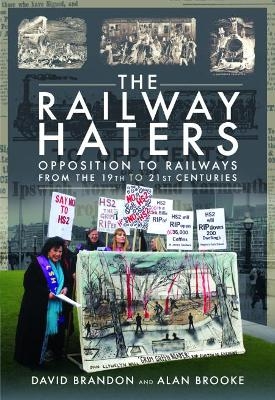
The Railway Haters
Opposition To Railways, From the 19th to 21st Centuries
Seiten
2019
Pen & Sword Transport (Verlag)
978-1-5267-0020-9 (ISBN)
Pen & Sword Transport (Verlag)
978-1-5267-0020-9 (ISBN)
Superb study looking at the Social, Polictical and Economic impact of the Railways.
The railways symbolised the changes taking place in Britain as a result of the Industrial Revolution, and they themselves greatly contributed to these changes. 'Old Wealth', in the form of the great landowning dynasties and the landed gentry, was under challenge from 'New Wealth' the energetic industrial and commercial, urban middle class. Railways, with powers of compulsory purchase, intruded brutally into the previously sacrosanct estates and pleasure grounds of Britain's traditional ruling elite and were part of this clash of class interests.
Aesthetes like Ruskin and poets like Wordsworth ranted against railways; Sabbatarians attacked them for providing employment on the Lord's Day; antiquarians accused them of vandalism by destroying ancient buildings; others claimed their noise would make cows abort and chickens cease laying.
Railways were controversial then and have continued to provoke debate ever since. Arguments raged concerning nationalisation and privatisation, about the Beeching Plan and around light rail systems in British cities and HS1 and HS2.
Examining railways from earliest times to the present, this book provides insights into social, economic and political attitudes and emphasises both change and continuity over 200 years.
The railways symbolised the changes taking place in Britain as a result of the Industrial Revolution, and they themselves greatly contributed to these changes. 'Old Wealth', in the form of the great landowning dynasties and the landed gentry, was under challenge from 'New Wealth' the energetic industrial and commercial, urban middle class. Railways, with powers of compulsory purchase, intruded brutally into the previously sacrosanct estates and pleasure grounds of Britain's traditional ruling elite and were part of this clash of class interests.
Aesthetes like Ruskin and poets like Wordsworth ranted against railways; Sabbatarians attacked them for providing employment on the Lord's Day; antiquarians accused them of vandalism by destroying ancient buildings; others claimed their noise would make cows abort and chickens cease laying.
Railways were controversial then and have continued to provoke debate ever since. Arguments raged concerning nationalisation and privatisation, about the Beeching Plan and around light rail systems in British cities and HS1 and HS2.
Examining railways from earliest times to the present, this book provides insights into social, economic and political attitudes and emphasises both change and continuity over 200 years.
David Brandon had many jobs before becoming involved in teaching and organising in Further and then Higher Education, specialising in Adult Education. He has published extensively on his own and co-operated with Alan Brooke on sixteen previous titles. His interests include British topography, walking, social and economic history, the history of London, of crime and of the Royal Navy. His main interest, however, has always been the railways of Britain and theireconomic, social and cultural impact.
| Erscheinungsdatum | 17.08.2019 |
|---|---|
| Zusatzinfo | 60 illustrations and selected maps |
| Verlagsort | Barnsley |
| Sprache | englisch |
| Maße | 172 x 246 mm |
| Themenwelt | Natur / Technik ► Fahrzeuge / Flugzeuge / Schiffe ► Schienenfahrzeuge |
| ISBN-10 | 1-5267-0020-4 / 1526700204 |
| ISBN-13 | 978-1-5267-0020-9 / 9781526700209 |
| Zustand | Neuware |
| Haben Sie eine Frage zum Produkt? |
Mehr entdecken
aus dem Bereich
aus dem Bereich
die Rhätische Bahn schreibt Geschichte
Buch | Hardcover (2023)
Edition Somedia (Verlag)
CHF 63,90
St. Moritz – Zermatt : die Traumreise im langsamsten Schnellzug der …
Buch | Hardcover (2023)
Verlag Berg & Tal
CHF 25,90
Betriebsmaschinendienst, Einsatz bei den Bahnbetriebswerken und …
Buch | Hardcover (2024)
EK-Verlag
CHF 68,90


